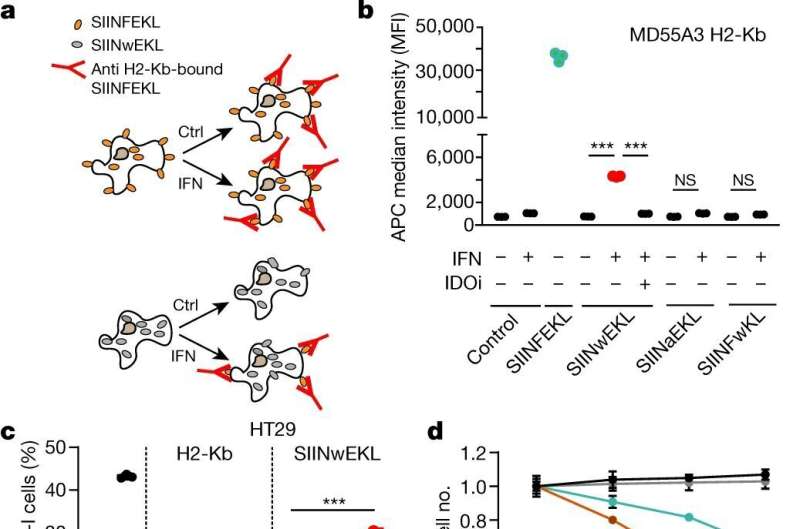March 21, 2022 report
Cancer cells found to replace depleted tryptophan using phenylalanine substitutants

An international team of researchers has found that some cancer cells are able to make up for a loss of tryptophan by conducting codon reassignments that allow for the production of phenylalanine "substitutants" (a word they coined to describe the peptides involved in their work). In their paper published in the journal Nature, the group describes how they genetically engineered cancer cells to help identify tryptophan-to-phenylalanine codon reassignments and the surprise they encountered when doing so. Pavel Baranov and John Atkins with University College Cork have published an editorial outlining the work by the team on this new effort in the same journal issue.
Prior research has shown that with some types of cancers, T cells in the vicinity of tumors secret interferon-γ as a means of combatting tumor growth. In response, the cancer cells begin expressing an enzyme that requires the use of an amino acid called tryptophan. But doing so results in depletion of tryptophan levels in the cell, which is a problem for the cancer cells because the human body is incapable of producing tryptophan—and cells need it because it is used in the biosynthesis of proteins. In this new effort, the researchers have found that under such scenarios, the cancer cells resort to carrying out codon reassignments that allow for the production of phenylalanine substitutants, which in turn take over synthesizing the proteins needed by the cell to survive.
The discovery by the researchers came about as they genetically engineered cancer cells in a way that made them encode for producing fluorescent proteins. The DNA in such cells held three-nucleotide sequences (codons) that are normally used as part of the processing involved with tryptophan. The researchers were surprised to find that the cells were still able to synthesize needed proteins despite very low levels of tryptophan. Taking a closer look revealed that the cancer cells were able to do this because they swapped the amino acids that were normally used in the process for different kinds. This swapping of amino acids pushed the cell's tRNA to recognize the elements in the codon as those found in tryptophan, even though they were not, and thus to join with phenylalanine substitutants to produce the proteins that were needed. The researchers also noted that the amino-acid sequence was altered, which could affect its function and structure.
More information: Abhijeet Pataskar et al, Tryptophan depletion results in tryptophan-to-phenylalanine substitutants, Nature (2022). DOI: 10.1038/s41586-022-04499-2
Pavel V. Baranov et al, Immune cells alter genetic decoding in cancer, Nature (2022). DOI: 10.1038/d41586-022-00637-y
© 2022 Science X Network
















